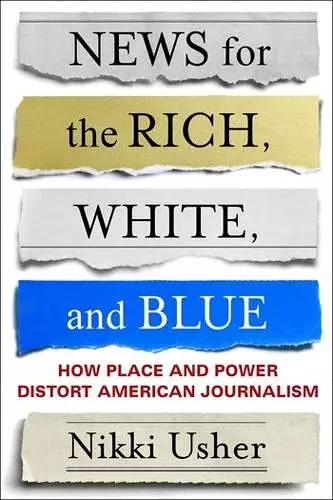News for the Rich, White, and Blue
How Place and Power Distort American Journalism
Format:Paperback
Publisher:Columbia University Press
Published:3rd Aug '21
Should be back in stock very soon

As cash-strapped metropolitan newspapers struggle to maintain their traditional influence and quality reporting, large national and international outlets have pivoted to serving readers who can and will choose to pay for news, skewing coverage toward a wealthy, white, and liberal audience. Amid rampant inequality and distrust, media outlets have become more out of touch with the democracy they purport to serve. How did journalism end up in such a predicament, and what are the prospects for achieving a more equitable future?
In News for the Rich, White, and Blue, Nikki Usher recasts the challenges facing journalism in terms of place, power, and inequality. Drawing on more than a decade of field research, she illuminates how journalists decide what becomes news and how news organizations strategize about the future. Usher shows how newsrooms remain places of power, largely white institutions growing more elite as journalists confront a shrinking job market. She details how Google, Facebook, and the digital-advertising ecosystem have wreaked havoc on the economic model for quality journalism, leaving local news to suffer. Usher also highlights how the handful of likely survivors—well-funded media outlets such as the New York Times—increasingly appeal to a global, “placeless” reader.
News for the Rich, White, and Blue concludes with a series of provocative recommendations to reimagine journalism to ensure its resiliency and its ability to speak to a diverse set of issues and readers.
News for the Rich, White, and Blue provides clear-eyed accounting of the monumental challenges facing American journalism and the rare non-nostalgic examination of how we’ve arrived here. Today, everyone is a media critic, but there are two distinct types: those who criticize with the aim of further discrediting the press and those who offer critiques because they dream of a better and thus stronger fourth estate. It’s clear that Nikki Usher belongs to the latter group, and it would serve our industry and our democracy for us to truly wrestle with the implications of her research and what they should mean for our path forward. -- Wesley Lowery, Pulitzer Prize-winning journalist
In this thought-provoking book, Usher contends that journalism that is not anchored in or accountable to community in the broadest sense poses an existential risk to democracy. News for the Rich, White, and Blue is an absorbing account of how elite, isolated journalism drives social polarization—and a compelling vision for how a media commonwealth can fortify the fourth estate and renew a sense of common purpose. -- Alondra Nelson, president of the Social Science Research Council
Usher has written this book with the narrative style of a journalist and the research skills of a social scientist. We finally have a book that explains the deep threats to American journalism at this most crucial of moments. It goes beyond a diagnosis of a malignancy. It’s a full call to action to reconnect the American people to journalism that can enrich their communities and sustain their democracy. -- Siva Vaidhyanathan, author of Antisocial Media: How Facebook Disconnects Us and Undermines Democracy
Deeply evidenced via a lens of power and privilege, News for the Rich, White and Blue catalogues place-based transformations for the press as symbolic of the nation’s polarization. In her argument that journalists are becoming distanced from those they cover—geographically, politically, economically, and culturally—Nikki Usher is both convincing and provocative. A riveting must-read for anyone interested in why journalism is stumbling in trying to serve the public good. -- Sue Robinson, author of Networked News, Racial Divides: How Power and Privilege Shape Public Discourse in Progressive Communities
In News for the Rich, White, and Blue, Nikki Usher has illuminated one of the hidden crises of democracy: the fact that mainstream journalism is increasingly trusted mainly by aging, white, affluent liberals. With critical ideas about the meaning of place, she has opened crucial new territory to our understanding of the public square, especially locally. This is an important book. -- Tom Rosenstiel, coauthor of The Elements of Journalism: What Newspeople Should Know and the Public Should Expect
An insightful and important book. * International Journal of Communication *
Usher analyzes the interplay between journalism, politics, and place, arguing that the loss of local journalism and the rise of concentrated, nationalized news organizations have played a central role in fostering media distrust...mount[ing] a compelling argument about the way place shapes journalism today. * Boston Review *
I found Usher’s book to be a provocative way to challenge the conventional wisdom in journalism, political science, and related disciplines. Many in these fields might not agree with her conclusions, but the points are well worth considering as we all work together to figure out a sustainable, inclusive model for local news. * Cleveland Review of Books *
Nikki Usher has written a remarkable book about the death – and possible rebirth – of the local newspaper. -- Jonathan Heawood * Open Democracy *
Insightful...a much needed addition to the continued unpacking of the 2016 US election and its aftermath. * Journalism *
An insightful and important book. * International Journal of Communication *
- Winner of Hazel Gaudet-Erskine Best Book Award, International Journal of Press/Politics 2022
- Winner of Journalism Studies Division Book Award, International Communication Association 2022
ISBN: 9780231184670
Dimensions: unknown
Weight: unknown
376 pages